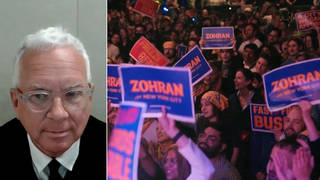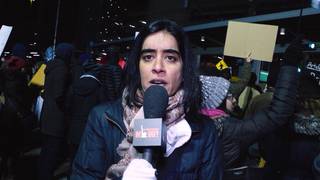
The Trump administration has expanded its contested travel ban to six additional countries — most of which are African nations. Under the new restrictions, nationals of Nigeria, Eritrea, Myanmar and Kyrgyzstan will no longer be able to obtain visas to live and work in the U.S., while Sudan and Tanzania will no longer be able to participate in the diversity visa lottery program. The ban, commonly referred to as the “Muslim ban,” already affects citizens from Iran, Libya, Syria, Yemen, Somalia, Venezuela and North Korea. The expansion is expected to affect more than 350 million people. Democrats say they will challenge the new ban and are expected to introduce the NO BAN Act in Congress soon. The latest travel ban takes effect February 22. We speak to Omar Jadwat, director of the ACLU’s Immigrants’ Rights Project.
Transcript
AMY GOODMAN: This is Democracy Now! I’m Amy Goodman, as we move on now to the new travel ban. That’s right. The Trump administration has expanded its contested travel ban to six additional countries, most of which are African nations. Under the new restrictions, nationals of Nigeria, Eritrea, Burma, Kyrgyzstan will no longer be able to obtain visas to live and work in the U.S., while nationals of Sudan and Tanzania will no longer be able to participate in the diversity visa lottery. The ban, commonly referred to as the “Muslim ban,” already affects citizens from Iran, Libya, Syria, Yemen, Somalia, Venezuela and North Korea. The expansion is expected to affect more than 350 million people. Democrats say they will challenge the new ban and are expected to introduce the NO BAN Act in Congress soon. The latest travel ban takes effect February 22nd.
For more, we’re joined by Omar Jadwat, the director of the ACLU’s Immigrants’ Rights Project. The ACLU has been challenging the Trump administration’s Muslim ban since the first ban was announced in January 2017. The ACLU won rulings against all three prior versions of the ban, blocking it until the Supreme Court allowed it to go into effect. They’re still litigating against it today. The Fight, a Sundance Film Festival film, also chronicles the fight of the ACLU around the travel ban.
Omar, it’s great to have you with us. Thanks so much for joining us.
OMAR JADWAT: Thanks for having me.
AMY GOODMAN: Explain what the Trump administration just laid out, as people are hardly paying attention.
OMAR JADWAT: Sure.
AMY GOODMAN: Between the impeachment, between the Iowa caucuses, what’s just happened?
OMAR JADWAT: So, essentially what’s happened is they’ve taken the Muslim ban, they’ve doubled down on that Muslim ban by extending it further. Right? Remember, this was supposed to be a temporary measure. Even when he promised the Muslim ban, it was supposed to be until they figured out what the hell was going on. Well, they still haven’t figured it out three years later, right? So, we have that original Muslim ban continuing, and we’ve essentially added on top of it a ban on Africans. A quarter of the people who live on the African continent are now — live in countries that are now subject to the expanded ban. And so, what we see here is the president going —
AMY GOODMAN: Wait, say that again. A quarter of the African continent, of the population of Africa —
OMAR JADWAT: Yeah.
AMY GOODMAN: — will now be under —
OMAR JADWAT: Live in a country where they’re going to be affected in one way or another by the ban. And so, you know, and remember, President Trump, we all recall the things he said about Muslims in the election campaign.
AMY GOODMAN: And we all recall what he said about Africa, African countries.
OMAR JADWAT: Right. Nigerians, right?
AMY GOODMAN: “Those” — I won’t say it — “s—hole countries.”
OMAR JADWAT: Who are the biggest group affected by the expansion of the ban, he said, would never “go back to their huts” if we allowed them to come to the United States, right? And so we just see him going from one prejudice to another, from one racist version of this ban to an expanded racist version of this ban. And that’s where we are today.
AMY GOODMAN: So, how does it affect countries and people who have already received visas?
OMAR JADWAT: So, people who have a visa right now are kind of grandfathered in. They can use that visa. But it affects, going forward, people who may have been in the process of waiting in line for visas for years, right? So you have people — and we’ve seen this with the existing ban — people who have family members, people in the United States who have family members abroad — spouses, fiancés, brothers, sisters, grandmas — who can’t come, even though they qualify entirely for visas under the law.
AMY GOODMAN: So, let’s take a country like Burma. You have the international Court of Justice that has just ordered Burma to take all measures within its power to protect Rohingya Muslims from genocide. The court issued the ruling last week — the week before, calling the 600,000 Rohingya remaining in Burma extremely vulnerable to military violence. Now no one from Burma can seek political asylum in the United States?
OMAR JADWAT: Well, if they manage to get here, they can seek asylum. But, of course, the way many people come to seek asylum in the United States is they come on a visa, and then they seek asylum. So, parts of that route will no longer be available to people from Burma. But again, I mean, if you look at the numbers and you look at the way that this ban has currently shaped, it’s very much a reflection of the president’s prejudice, specifically against Muslims and Africans.
AMY GOODMAN: Nigeria has the sixth-largest Christian population in the world. It also has the fifth-largest Muslim population. So, how is the ACLU — how is this being dealt with?
OMAR JADWAT: Right. So, we have an ongoing case against the ban, as it stood or as it continues to stand, the core of the ban that’s been in place for three years now. And so, we are continuing — we actually just had an argument in that case last week. Even though the Supreme Court obviously dealt us a significant setback when it allowed the ban to move forward, that case is still ongoing, and we will continue to litigate that case vigorously. And it’s our view that at the end of the day we will be able to establish that, notwithstanding everything that’s happened today, notwithstanding the fact that we’ve had to live under this ban for years, that we will show at the end of the day that it’s unconstitutional.
AMY GOODMAN: Explain the Trump administration’s rationale here.
OMAR JADWAT: Well, their rationale is that these countries, they say, do not adequate — share enough information with the United States so that we can vet their citizens when they come. And before the first ban came into place, sure, there were countries where we vetted people more strongly because we didn’t necessarily think the countries sent enough information, but we did the vetting, and we never had these per-country bans on this kind of a basis, right? And it’s clear that the ban — this whole rationale was reverse-engineered to fit what the president wanted to do, right? As Rudy Giuliani said, “Muslim ban, let me tell you how to do it legally.” Right? And so, he said he wanted a ban. They came up with this basis. And now they’re using that same basis to expand it and go after other groups.
AMY GOODMAN: Omar, can you explain the NO BAN Act in Congress?
OMAR JADWAT: Sure. So, the NO BAN Act would really strict the ability of this president or any other president to use the power that he’s relying on in the law to go after groups of people. And so, it’s an important reform to our immigration laws, because the way that the Supreme Court understood the law is giving the president great power to basically enact whatever he thinks the restrictions ought to be on people who can come to the country.
AMY GOODMAN: Omar Jadwat, we want to thank you for being with us. We will continue to follow this. Director of the ACLU’s Immigrants’ Rights Project. The ACLU has been challenging the Trump administration’s Muslim ban since the first ban was announced January 2017, winning rulings against all three prior versions of the ban, blocking it until the Supreme Court allowed it to go into effect. They’re still litigating against it today.
This is Democracy Now! When we come back, the Pulitzer Prize-winning journalist Laurie Garrett joins us. She has written a new piece about the coronavirus. Stay with us.
[break]
AMY GOODMAN: “To Hell with Poverty” by Gang of Four. Founding member and guitarist Andy Gill died in London Saturday at the age of 64.












Media Options